Ex-Wolves & Nigeria keeper Carl Ikeme on cancer which took his career - and almost his life
- Published
- comments
Former goalkeeper Ikeme opens up about leukaemia
Wolves and Nigeria goalkeeper Carl Ikeme was diagnosed with acute leukaemia in July 2017.
After 12 months of gruelling treatment which cost him his career, his lifelong dream of playing at a World Cup, the chance of being present at the birth of his second daughter and almost his life, Ikeme was told he was in complete remission.
The 32-year-old must have further, less invasive, treatment and Ikeme admits he is not sure what the future holds.
"I am unemployed," he says, more than once, with a smile.
This is his story.
A devastating phone call
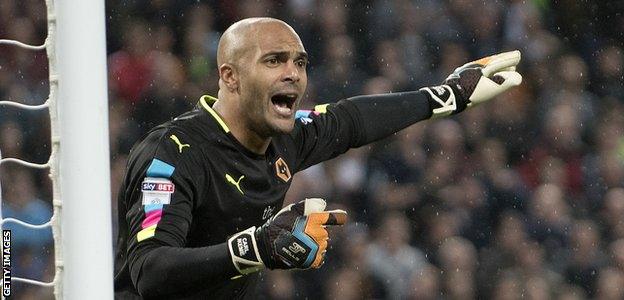
Carl Ikeme played for Wolves for more than a decade and had loan spells at Accrington, Stockport, Charlton, Sheffield United, QPR, Leicester, Middlesbrough & Doncaster
Ikeme had reported for pre-season training feeling physically fit and anticipating an exciting campaign ahead.
Wolves had a new manager - Nuno Espirito Santo - and there was a feeling of optimism around the club.
Ikeme had no idea his world was about to be turned upside down.
He recalls: "I had a couple of blood tests at the start of pre-season that showed my platelets were a little low.
"There was no massive alarm. I carried on training - I was fit, I was healthy.
"We did a hard session, then went to the gym. I had a bleeding nose. I never told the doctor anything because I knew he would pull me out of training - for some reason, this time I told him about the nosebleed and a slight headache.
"I had another blood test, which was still low, so he said we had to see a specialist.
"You take a little gasp of breath when they tell you what they are testing for but I never thought, a few days later, it would be cancer.
"I was at Homebase when I got a call from the doctor.
"I was expecting him to say everything was fine. I can't remember him saying 'you've got cancer' but I do remember him talking about Geoff Thomas and Stan Petrov and that it was going to be a tough year for me and my family.
"I remember being in the car park and tearing up.
"At the time my daughter Mila was four. I thought 'Am I going to be there for her?'. My partner Saba was heavily pregnant and due to give birth a week later. I thought 'I am going to die'."
'Why not me?'
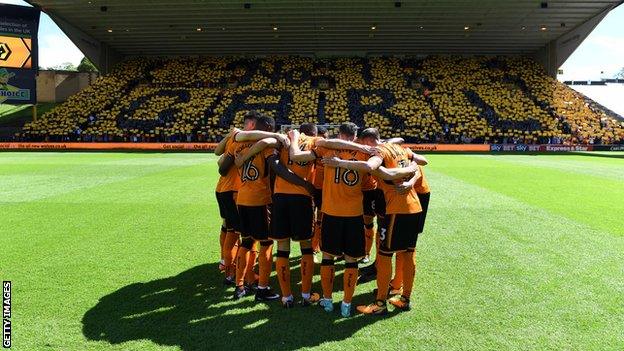
Wolves fans spell out Carl Ikeme's name in tribute at Molineux before a Championship match against Middlesbrough in August last year, just a month after he started his treatment
Ikeme drove home to some of the toughest conversations of his life.
Saba was told. So were his parents. Mila was not.
"She doesn't know. She is too young. I couldn't tell her 'Daddy might not be here anymore'. I didn't want to change anything for her.
"She knew I was in hospital a lot but she just thought 'Daddy's not very well' or 'Daddy's got to see the doctor'. I am sure she will find out eventually but now, it is something she doesn't need to know.
"Saba was different. Obviously I have seen her cry before but that…
"Then my mum, my dad, my sister came round. To see the pain on their faces. It is something a son or daughter should never have to tell their parents; that they have cancer.
"That night, my whole thought process was around the two kids and Saba. I might have one child who would never see their dad and another who might grow up without him. How would Saba cope if I wasn't there?
"I did start off thinking 'why me? I am not a bad person'. But after a couple of days it was 'why not me'. Why shouldn't it be me?
"People have tough lives. People get diagnosed with disease. This is my journey. This is supposed to happen. Acceptance was a big part of helping me get through my treatment."
A new arrival
Ikeme was given the option of delaying the start of his treatment so he could be present for the birth of his second daughter. He declined.
He was diagnosed on 6 July and started treatment at Manchester's specialist Christie hospital a couple of days later. Maya was born five days' late, on the 16th.
"I found out through FaceTime," he said. "It was surreal knowing I was having a baby but I wasn't actually there. I had never imagined missing the birth. I didn't get to hold her for a week.
"Once the treatment started, I lost a lot of weight quite quickly, nearly two stone in three weeks.
"Initially I was still physically OK. I could go for walks.
"As the treatment went on, I needed people to help me out.
"There were times when I felt tired cooking for myself or doing things around the house.
"Mum, dad, Saba, friends would be there.
"There were also times when I didn't feel great and I just wanted to be on my own and suffer in silence.
"There were a lot of times when I felt weak and would get out of breath doing minimal things.
"One day I got a taxi to the hospital. It was so hard getting in the taxi. I was so out of breath. As soon as I got to hospital, the nurse said 'you are not looking too good. You will have to stay here'. It was tough.
"I knew how hard it was for my family. I could see it in their faces. They were there when I was in pain or suffering. I would tell them I was all right and not to worry but I can't imagine what it was like when I wasn't there.
"It is a mental thing as well. To start off with I thought about dying. It wasn't in my head all the time but I might have a bad night and think about it a little bit, or when I had bone marrow testing I might think 'has it come back?'.
"I had to ride the bad phases. I am quite strong mentally. I was planning for the future. I booked a holiday for my friend's wedding in January. That was my goal. To be there to be best man at his wedding. I was trying to plan ahead instead of thinking about the other side of things."
A lucky escape
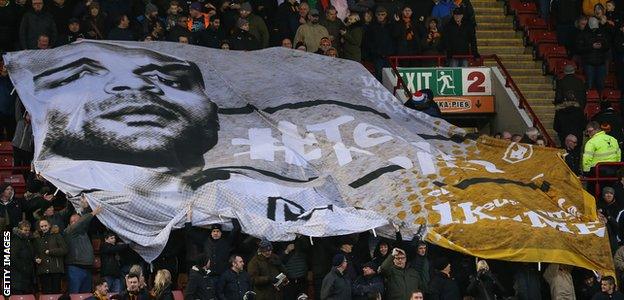
Wolves' supporters were an inspiration to Ikeme during his treatment
By his own admission, Ikeme remained largely ignorant of the detail behind the treatment he was having. It felt easier that way and allowed him to focus on the more positive aspects of his life.
However, it also meant he was unaware of the consequences of situations he found himself in.
It wasn't until six months after the event, as he approached the end of his treatment and took the rare step of reading through his notes, that it hit home just how serious one incident in particular could have been.
He said: "Treatment for leukaemia reduces your immune system to nothing, which leaves you at risk of infection.
"This particular Sunday, I was at home in Birmingham and I just didn't feel right. Just a bit funny. I didn't do anything about it. I thought I could sleep it off. A couple of hours later my temperature was nearly 40 degrees.
"The hospital told me to go straight to A&E. I had a really rough 10 days in hospital. I was always thinking 'tomorrow I will be OK'. But tomorrow came and I wasn't.
"It didn't really click until I read my notes a long time afterwards and saw I had sepsis., external I asked the doctors about it and realised I had been in really bad shape. It was a danger to my life and I didn't realise."
Good news - and bad
From the very first diagnosis, Ikeme knew it was unlikely he would play professional football again.
After 271 appearances, 207 of them for Wolves, the only club he was ever contracted to, Ikeme had enjoyed experiences denied to all but the very best players.
He accepted confirmation the end had come in typically sanguine fashion, knowing the news around his ultimate aim of survival was far more positive.
He said: "When the doctor suggested I needed to worry about my health not football and call it a day, it wasn't a shock.
"I had finished my last intense treatment and it was time for me to go home. I got my stuff out of my apartment and said to the medical staff 'If someone asks what the situation is now, what do I tell them?'. They told me I was in complete remission and I could get on with my life.
"It is strange really. I got home in time for Mila's fifth birthday. I was delighted to be there. But I was still recovering. I was not in the greatest of condition.
"It is still not over for me now. I am still being treated. I still have hurdles to jump.
"But I am so happy to be living a normal life, being with my family, being able to have breakfast with the kids."
Nigeria and missing the World Cup
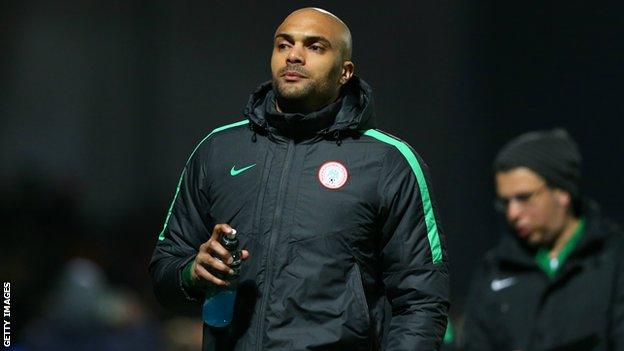
Former Nigeria goalkeeper Carl Ikeme hopes to join the Super Eagles' coaching set-up
Ikeme was born in Sutton Coldfield but his dad is from Nigeria.
He was first named in a provisional squad for the Super Eagles by manager Berti Vogts in 2007. But he did not make his international debut until 2015, after which he became Nigeria's first-choice keeper.
When his illness meant he was unable to go to the World Cup in Russia, Nigeria named him as their '24th player'.
He said: "The World Cup was the hardest thing, football wise, for me to deal with.
"When we played England at Wembley in June, I felt 'it should have been me'. It was the same during the first match of the World Cup. It is not a case of life not being fair, more that every kid wants to play at one.
"I watched the matches through multiple angles. Even though I had my own issues, I couldn't think the games didn't matter. I had an emotional involvement.
"They were my team-mates. People I class as friends. When Argentina scored in the last minute to knock us out, I was angry in my living room. I felt bad as a fan. I felt sad for my team-mates and sad for Nigeria.
"I can't explain how joyous playing for Nigeria was for me. To know my whole family was proud. To know I was representing 200 million people who are mad about football. I love it there.
"I have unfinished business with Nigeria. I have spoken to the manager, Gernot Rohr, about learning from him; about the set-up and understanding the tactics from the sidelines. He has offered me the opportunity to go and be one of his assistants, which is great.
"I am hoping to be involved in an upcoming fixture against Libya in October. If not that one, the next."
Bouncing back
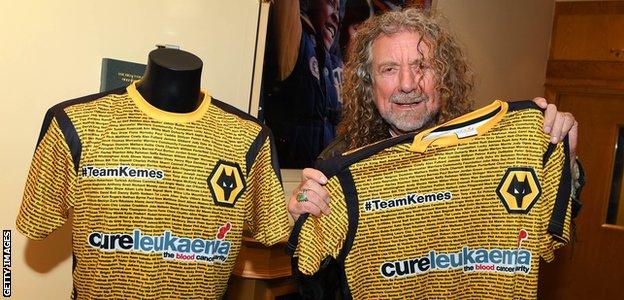
Wolves fan and Led Zeppelin singer Robert Plant with a charity shirt for Carl Ikeme which the team wore in a game against Middlesbrough
There is a prominent picture on Ikeme's social media. It is of a boomerang. It is a gift from a local plumber who made it when in the Australian outback with a group of indigenous people.
Ikeme said: "The plumber didn't say anything. He just gave me the boomerang and a note when he came back to the house on the second day. It was touching that someone gave up something that was obviously sacred to him to help me with my struggle. It will always be there in my living room.
"The generosity of people throughout my treatment was moving. On social media every day people would ask if I was OK. You never realise they have that affection for you. It is something I was so grateful for - and I still am.
"I am not sure what the future holds. I am unemployed and just taking it day by day.
"I would love to go and learn from the Nigerian FA. Come to Wolves and learn a little bit from them. Maybe do a bit of media work.
"I am not anxious to jump into something because being with my family is my priority at the minute.
"I wake up every morning happy to be here."